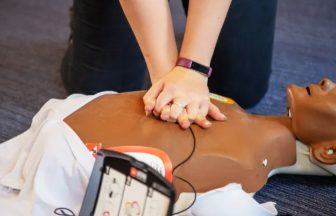Ticks are becoming a growing year-round threat because of climate change, experts have warned.
Lyme disease, a bacterial infection that causes a range of health problems, can be spread to humans from some tick bites.
And a virus carried by ticks that can cause meningitis has now been detected in several areas of England, prompting health officials to remind the public on how to avoid being bitten by the tiny bugs.
Public Health Scotland (PHS) is working with NHS boards and partners to enhance the surveillance of tick-borne encephalitis in Scotland.
Experts have said the chances of getting tick-borne encephalitis are low, but the tick species that carries the virus could be widespread across the UK.
And, while most people don’t develop symptoms, it can possibly lead to severe infections in the central nervous system such as meningitis or encephalitis.
What are ticks?
Ticks are small, spider-like creatures which feed on the blood of birds and mammals, including humans. They vary in size, usually between 1mm to 1cm long. They have either six or eight legs.
Tick season is usually between March and October but can last longer due to wet weather and warmer temperatures making ticks active for longer in the year.
However, ticks are something that people should think about all year round as some symptoms of a tick bite, including inflammation, can take two to three months to develop.
In Scotland, the most common disease ticks transmit is Lyme disease, also known as Lyme borreliosis. They also carry other diseases but these mainly affect animals.
In other parts of the world, ticks can spread different diseases, some of which can cause serious illness in both humans and animals
Ticks feed off of a variety of mammals and birds, including squirrels, deer, sheep and garden birds. This means they’re usually found in areas with these animals, like:
- woodland
- moorland
- grassy areas
- gardens
In April, health officials said tick-borne encephalitis is “likely” to be present in the UK.
It comes after the first domestically acquired case of the virus was confirmed in Yorkshire, England.
The assessment, published by a joint UK Health Security Agency (UKHSA) and DEFRA committee, based its findings on both human cases and the detection of the virus in ticks in several areas of the country.
Dr Nick Phin, director of public health science and medical director at Public Health Scotland, said: “While the risk of acquiring tick-borne encephalitis in Scotland is very low, we know that ticks can cause other infections, such as Lyme disease.
“We would encourage everyone to familiarise themselves with the steps we can all take to avoid bugs and germs outdoors. Being tick aware, trying to avoid being bitten by ticks and removing any ticks that do bite as quickly as possible, are all important precautions.”
Tick-borne encephalitis virus (TBEV) is already common in many parts of Europe, and is an important cause of viral infections in the central nervous system, according to the World Health Organisation.
It can cause a range of illnesses from completely asymptomatic infection, to mild flu-like illness, to severe infection in the central nervous system such as meningitis or encephalitis.
What is tick-borne encephalitis virus?
Tick-borne encephalitis (TBE) is an infection spread by tick bites. Ticks that spread it are found in parts of Europe and Asia, and some parts of the UK. Most infections remain asymptomatic, but some cases will develop a number of symptoms:
- Initial symptoms can include fatigue, headache and general malaise, usually combined with fever of 38C.
- Up to 15% of patients experience a second phase of the disease characterised by fever frequently exceeding 40C and signs of central nervous system involvement
- The central nervous system involvement can include meningitis (e.g. fever, headache, and a stiff neck), encephalitis (e.g., drowsiness, confusion, and sensory disturbances), myelitis or radiculitis.
- Encephalitis developing during this second phase may result in paralysis, permanent sequelae or death.
- Severity of illness increases with age of the patient, but fatalities have been reported from all age groups.
Where have the infected ticks been found?
There have been three cases of probable or confirmed tick-borne encephalitis (TBE) in England since 2019, with the first confirmed case in Yorkshire in 2022, and a probable case detected in the Loch Earn area of Scotland in the same year.
The virus has also been detected in the Hampshire, Dorset and Norfolk areas of the country, but may also be present elsewhere, according to a risk assessment published by the UKHSA and DEFRA.
The virus is also found in most of Europe, Russia and parts of China and Japan.
Ticks live in forests and grassy areas. You’re more at risk of being bitten if you do activities such as hiking and camping.
Not all ticks spread TBE. Even if you’re bitten, the risk of getting seriously ill is low.
What should you do if bitten by a tick?
Members of the public who become unwell after a tick bite have been told to seek GP advice, and to seek urgent medical attention if they have:
- Symptoms of meningitis, including severe headache, stiff neck, pain looking at bright lights
- Or if they develop sudden neurological symptoms including a seizure, sudden confusion, weakness, or facial dropping
How to remove a tick
Ticks can be removed using a pair of tweezers – which is best done by grasping the tick as close to the skin as possible, pulling upwards slowly and firmly.
The whole tick needs to be removed as the mouthparts left in the skin can cause infection.
Doctors advise that you wash the area and monitor it for changes, but if you experience flu-like symptoms or a red circular rash they advise contacting your GP.
Follow STV News on WhatsApp
Scan the QR code on your mobile device for all the latest news from around the country




























